About the Conference
 The Annual Meeting was co-chaired by Committee of 100 members X. Rick Niu, Chien Chung (Didi) Pei, and Peter Young, who led the planning committee and the staff in the organization of the 2019 event.
The Annual Meeting was co-chaired by Committee of 100 members X. Rick Niu, Chien Chung (Didi) Pei, and Peter Young, who led the planning committee and the staff in the organization of the 2019 event.
We were honored to be joined by so many long-time supporters and distinguished guests for our 30th Anniversary Celebration. Over 700 guests, speakers, and sponsors participated in our Awards Gala Dinner, Full-Day Conference, and Town Hall on April 5-7, 2019. Immense gratitude to our members, speakers, and sponsors for making it all possible.
Awards Gala Dinner
The 30th Anniversary events started with the Awards Gala Dinner on April 5. The Gala featured Committee of 100 member Alice Young, Founder of Alice Young Advisory LLC, as the Master of Ceremonies.
Committee of 100 Chairman H. Roger Wang kicked off the Gala by looking to the future evolution of U.S.-China relations and the underlying role Committee of 100 will play. “Committee of 100 is in a very special position to serve as a trusted bridge and provide our understanding of our 30 years of work in this area for how the U.S. and China can build a more positive and constructive future,” he said. “The work is going to be challenging but I truly believe that these two great nations, two great countries, and two great peoples will find a way to come out with a cooperative and collaborative resolution to face this new challenge.”
After a video produced by Grammy award winning producer and Committee of 100 member Julie Fong was shown that highlighted the 40th Anniversary of the normalization of relations between the U.S. and China, former U.S. Secretary of the Treasury Lawrence H. Summers, Charles W. Eliot University Professor and President Emeritus of Harvard University, opened the Gala dinner as the opening keynote speaker, noting that successful U.S.- China relations with regard to information technology and life sciences could usher in marked improvements in the human condition – and that without cooperation, the first half of the 21st century could be sobering and cautionary. Summers remarked, “The challenge is before us, I believe that it is one that will be met, but it is one that will be met not automatically, but with the kind of leadership represented by the Committee of 100.”
Ambassador Huang Ping, Consul General of the People’s Republic of China in New York, noted that even as trade, economic, and people-to-people exchanges are in full swing, there are growing misgivings about China’s national policy and long-term strategic intentions. Ambassador Huang concluded, “Frankly speaking, these opinions have lost sight of how much China and the U.S. have benefitted from each other’s development, and how much they can achieve together by a shared vision and a common responsibility.”
Congresswoman Grace Meng, U.S. Representative to New York’s 6th District, commented, “Thank you [Committee of 100] so much for the incredible work that you do. Asian Americans are still constantly underrepresented in so many fields and major decision making tables, but we are making progress and that is thanks to so many of you here today.”
In celebration of its 30th Anniversary, C100 recognized five Governors, Yo-Yo Ma, I.M. Pei, Henry S. Tang, Oscar Tang, and Shirley Young, for their vision when they co-founded the Committee of 100.
The Lifetime Achievement Awards followed honoring I.M. Pei with the “Lifetime Achievement Award for Global Architectural Design,” accepted by his son and C100 member Chien Chung (Didi) Pei; Morris Chang with the “Lifetime Achievement Award for Global Technology Innovation,” and Maurice R. Greenberg with the “Lifetime Achievement Award for Advancing U.S.-China Relations”. Later in the evening, Peter Wang was given a posthumous award for embodying the best of American ideals and heroism. He was the 15-year-old Chinese-American freshman who gave his life while saving his classmates in the Parkland shooting last year. C100 member Julie Fong, Film Producer at Partizan Entertainment, introduced the posthumous award and cited numerical data to emphasize the severity and frequency of school shootings in the U.S.
Greenberg, Chairman & CEO of Starr Companies, an American insurance and financial services conglomerate celebrating its 100 years of doing business in China, commented on the future of U.S.- China relations, saying, “It’s very important that our two countries find ways to get together. The world is a much safer place with China and the U.S. as allies, and hopefully as close ones.”
Chang, Founding Chairman of Taiwan Semiconductor Manufacturing Company, Ltd. and C100 member, in his acceptance speech reminded everyone of the importance of C100’s dual mission. “One part of the mission is to improve U.S.-China relations, and another part is to raise the stature of Chinese Americans in America,” he said.
Following the awards, David Rubenstein, Co-Founder & Co-Executive Chairman of The Carlyle Group, moderated a fireside chat with tech titans, featuring Morris Chang and Bill McDermott, CEO of SAP. These global icons, all of whom have extensive U.S.-China involvement, spoke about their personal experiences and how they shaped them as leaders.
One of the highlights of the Gala dinner was a performance by C100 Governor Yo-Yo Ma. He began with a performance of String Quartet No. 2, Op. 35 by Anton Arensky with four NYO-China alumni and followed with a solo performance where he weaved together commentary and presentation with his signature cello performance. Speaking of the connection between the founding of C100 and today’s U.S.- China relationship, Ma commented, “three decades later, the need for bridge building is greater than ever. The work is not finished. I’m here tonight, as a musician, a citizen and a member of the Committee to remind us all of the essential role that culture plays not just in understanding or building bridges but in defining our common future.” He concluded, “Cultural evolution will be a main force driving our future, we are therefore the architects of that future.”
The closing keynote, by the Honorable Kevin Rudd, President of Asia Society’s Policy Institute and 26th Prime Minister of Australia, reflected on the historic nature of the U.S.-China relationship, noting that diplomacy and mutual self-interest had allowed the relationship not just to survive but to prosper. He also cautioned, “Let us be very careful when this country legitimately conducts its national debate on the future of its China strategy, Republican or Democrat. Let us not create an atmosphere where those who are Chinese Americans are in any way placed under a cloud of suspicion. We must stand firm against the appearance of anything which resembles a new McCarthyism.”
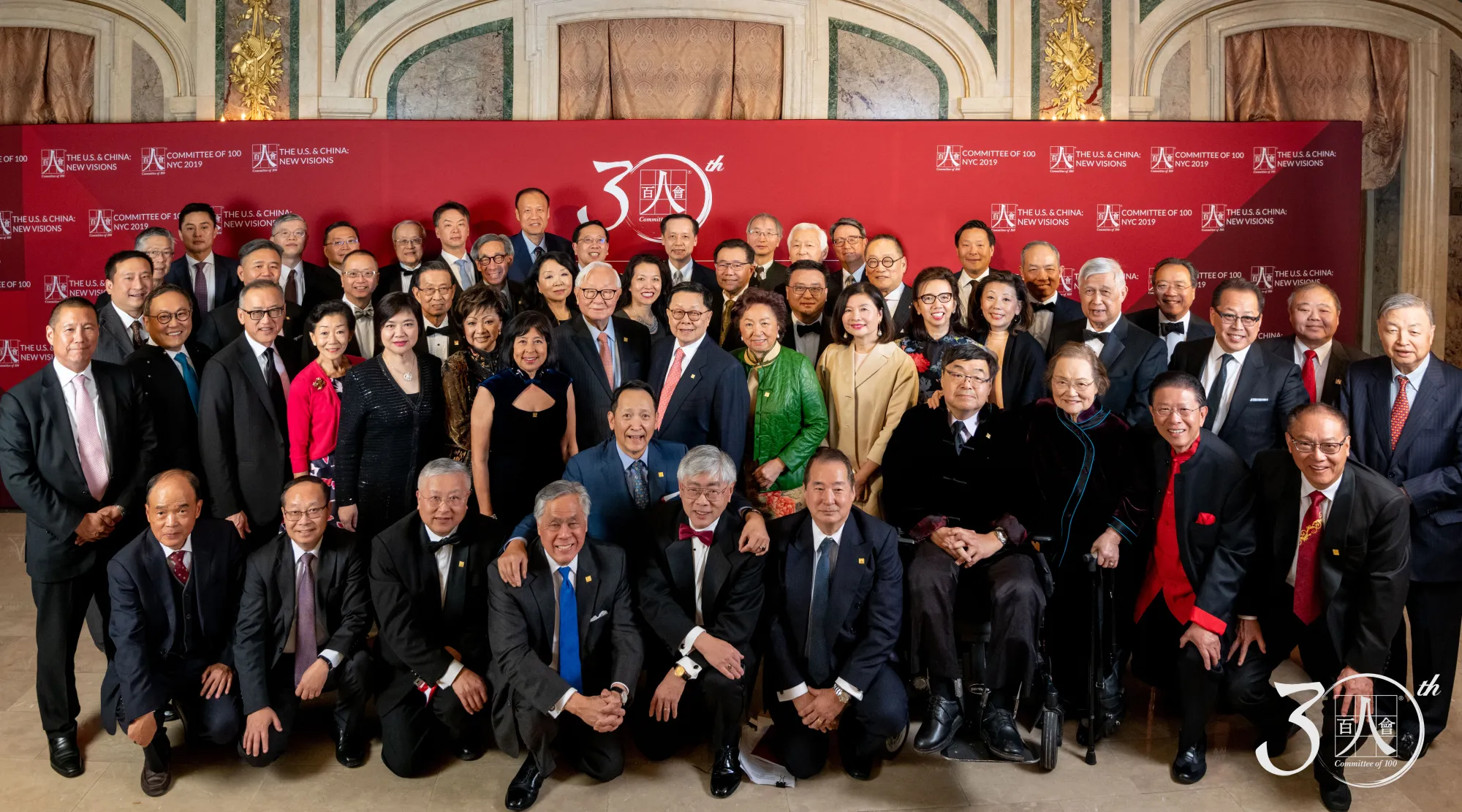
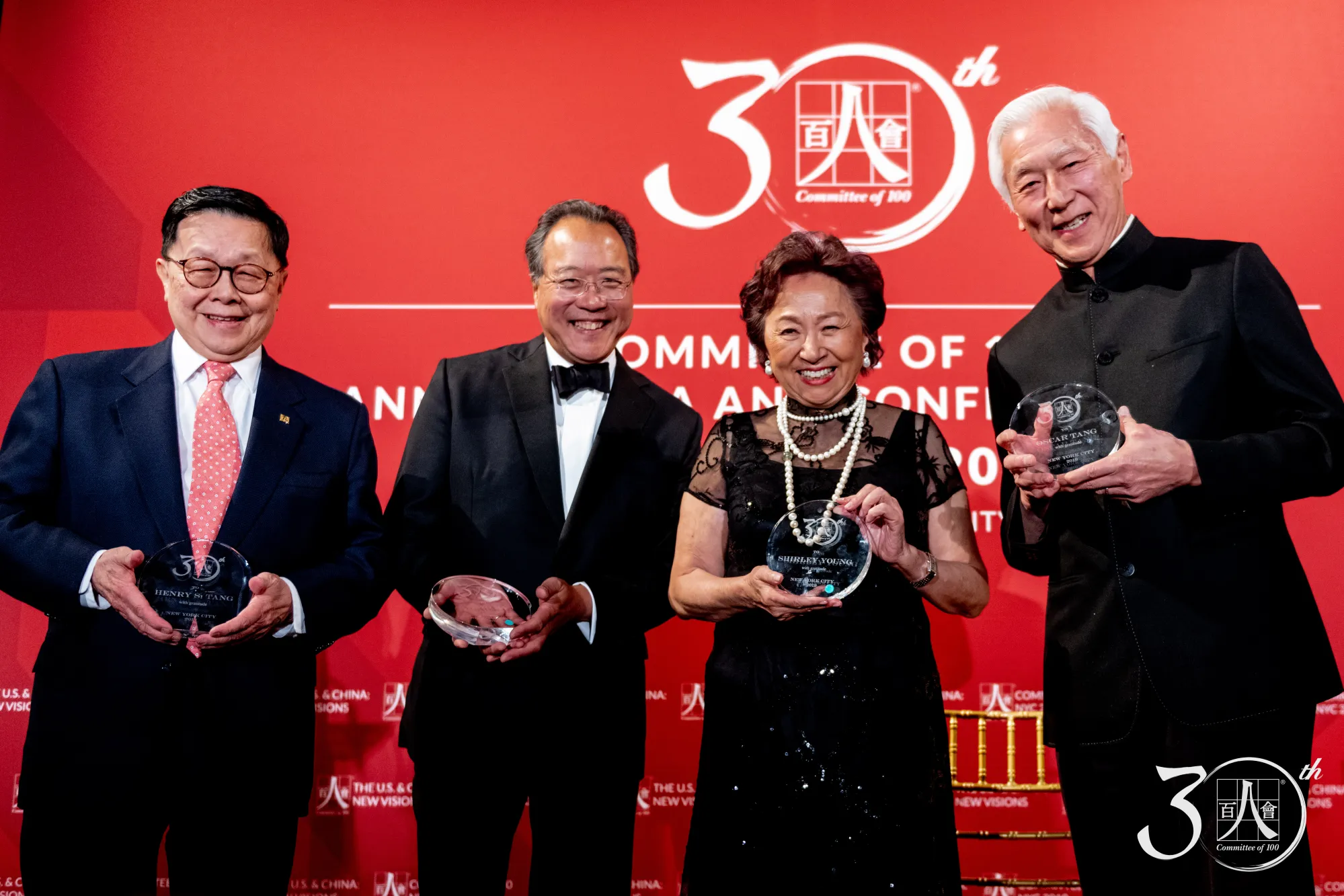
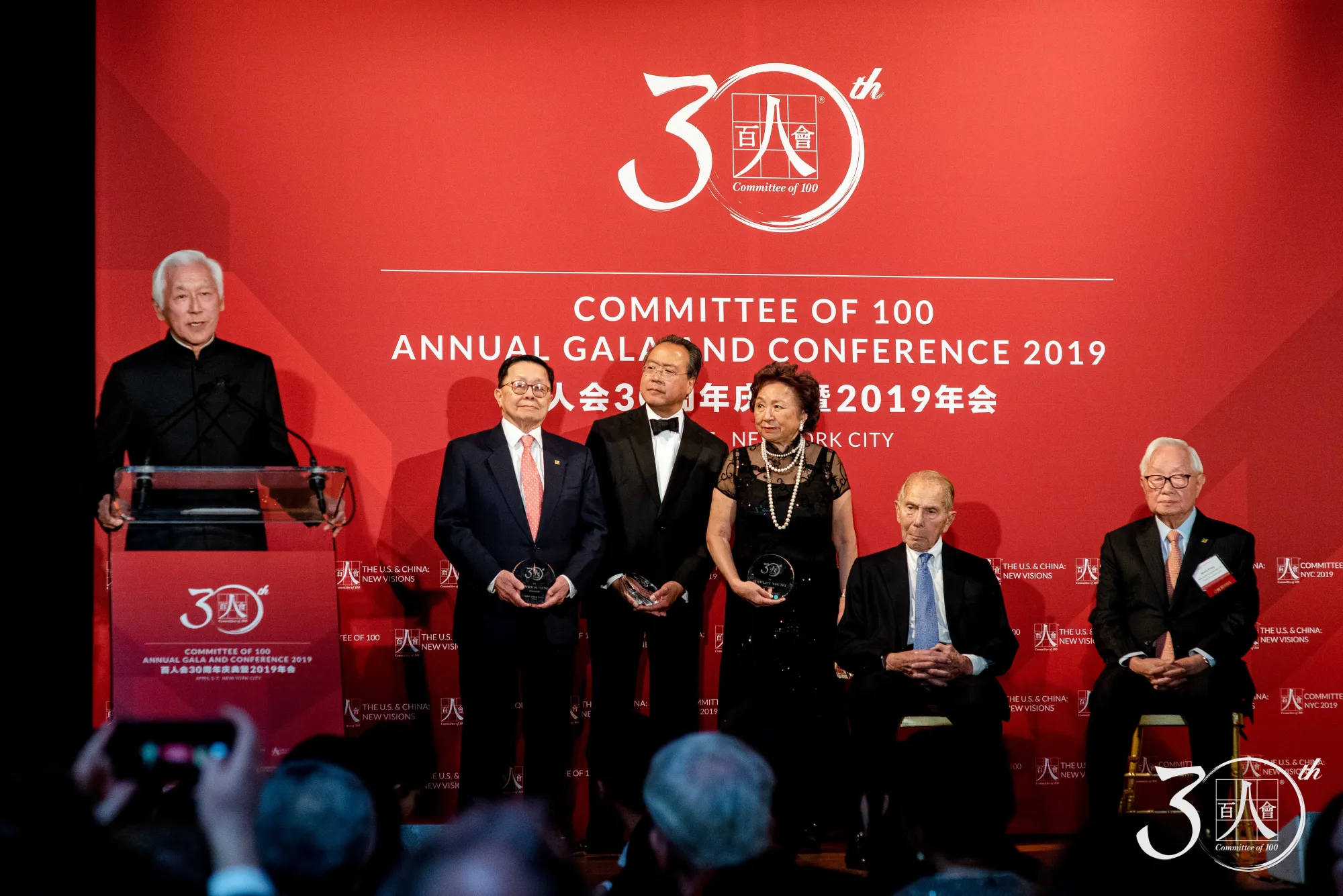
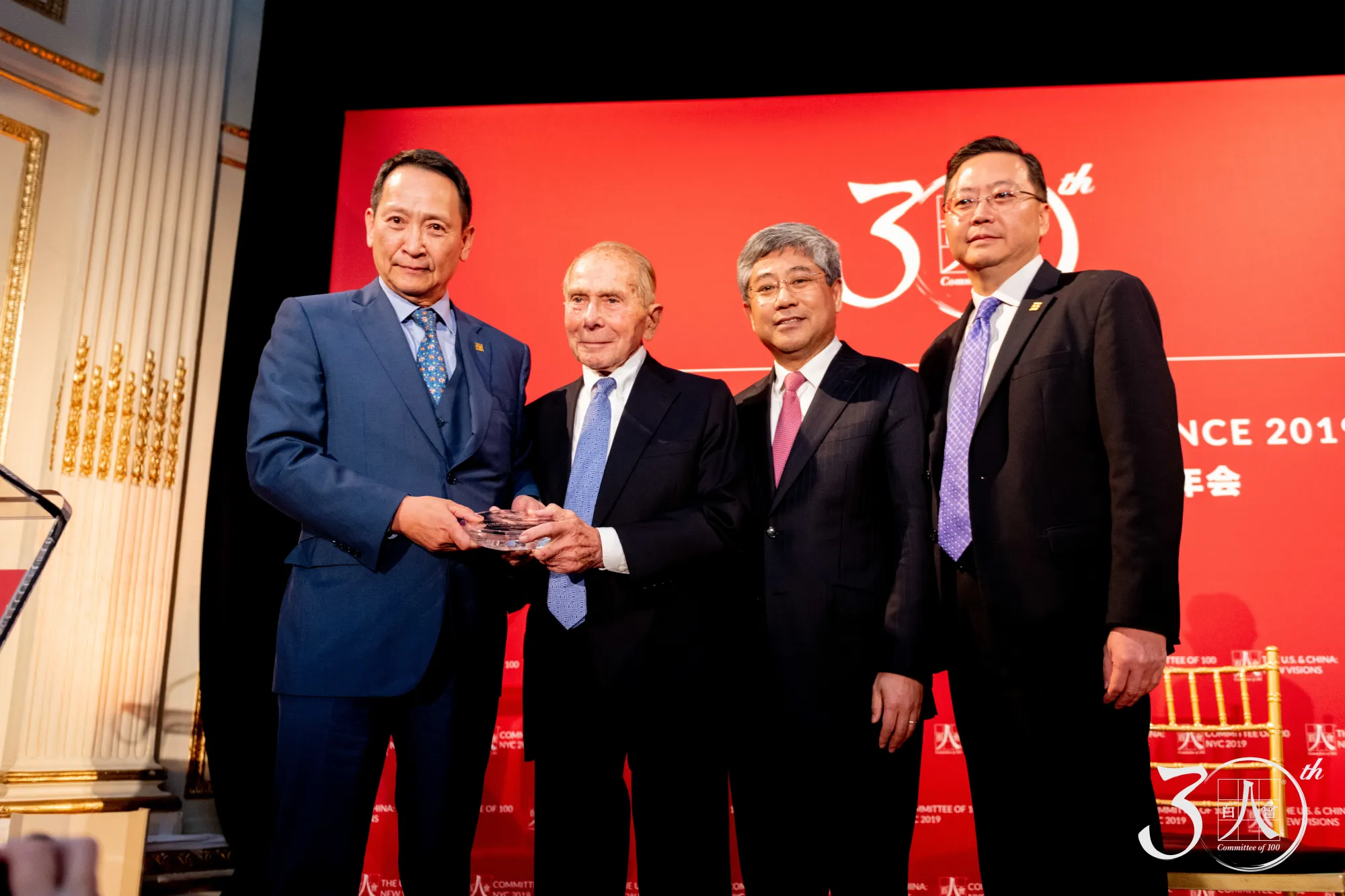
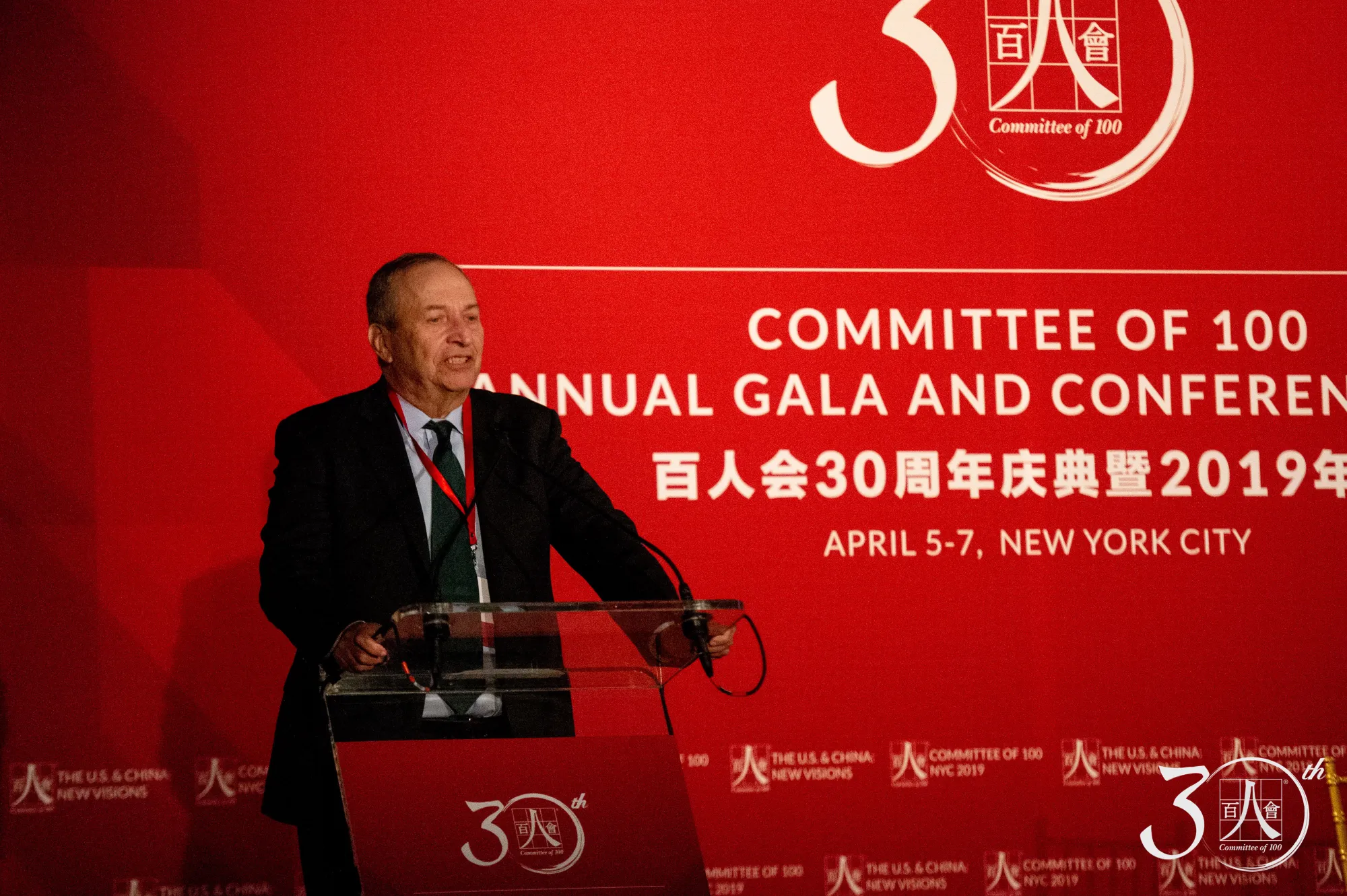
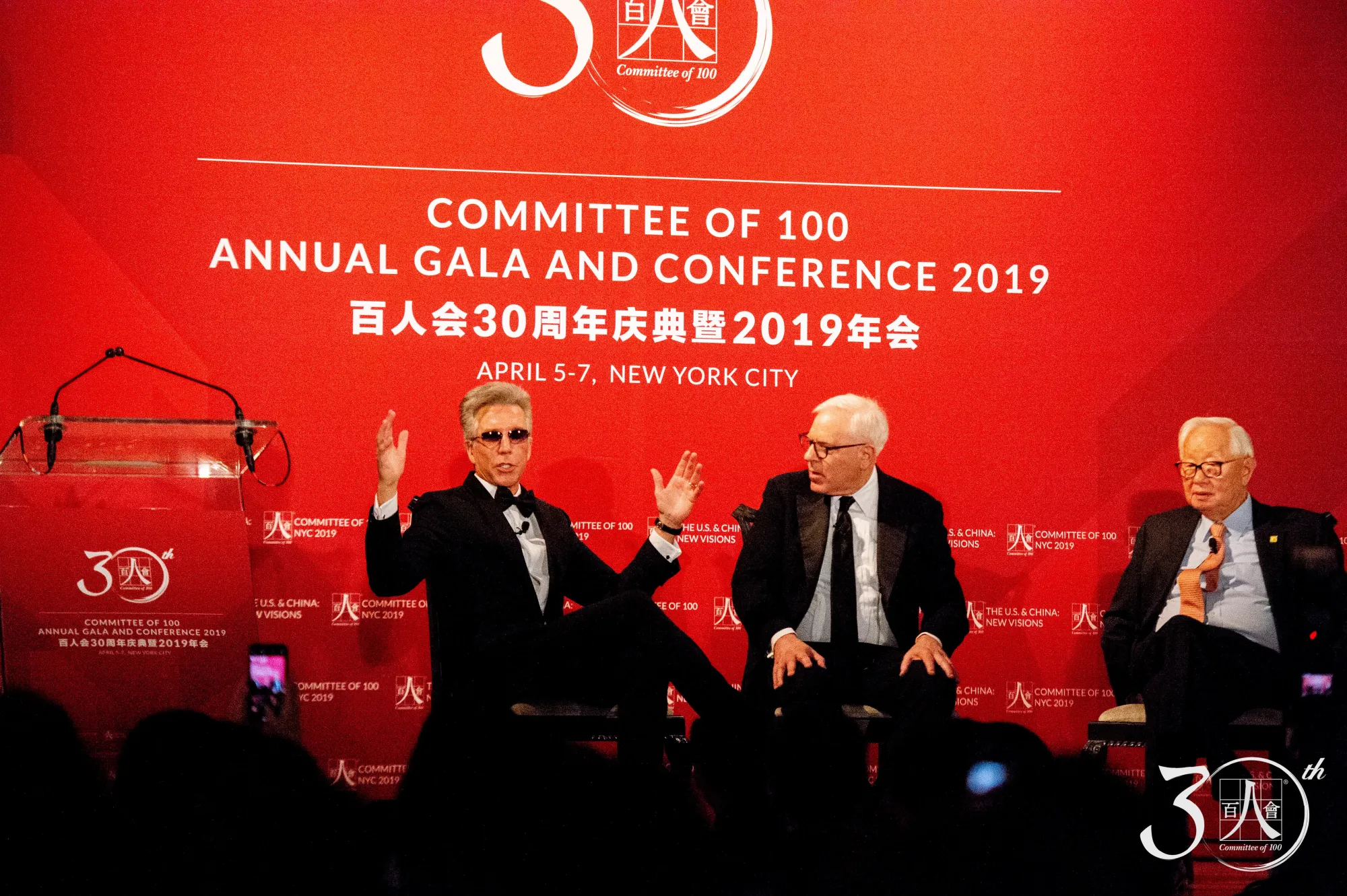
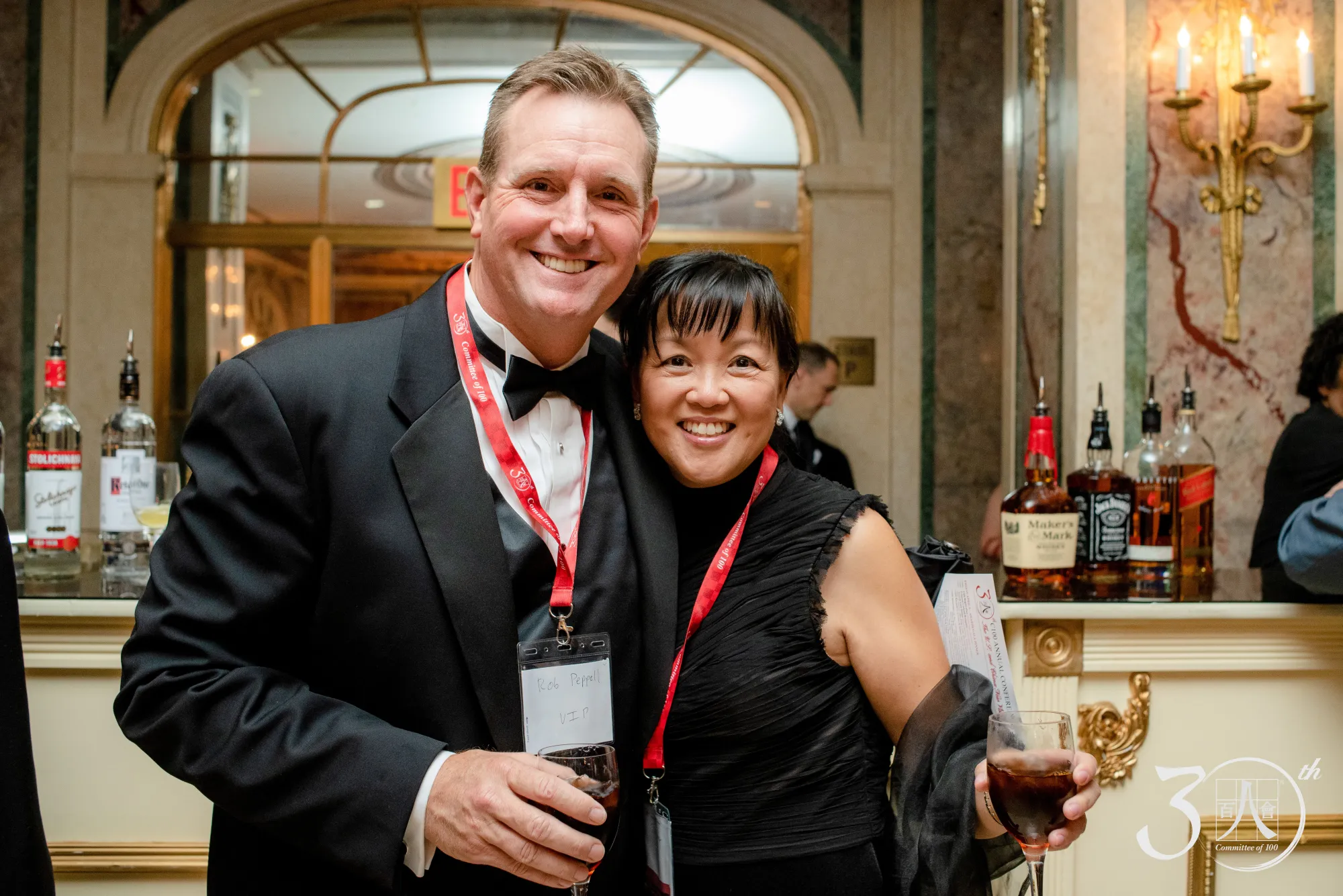
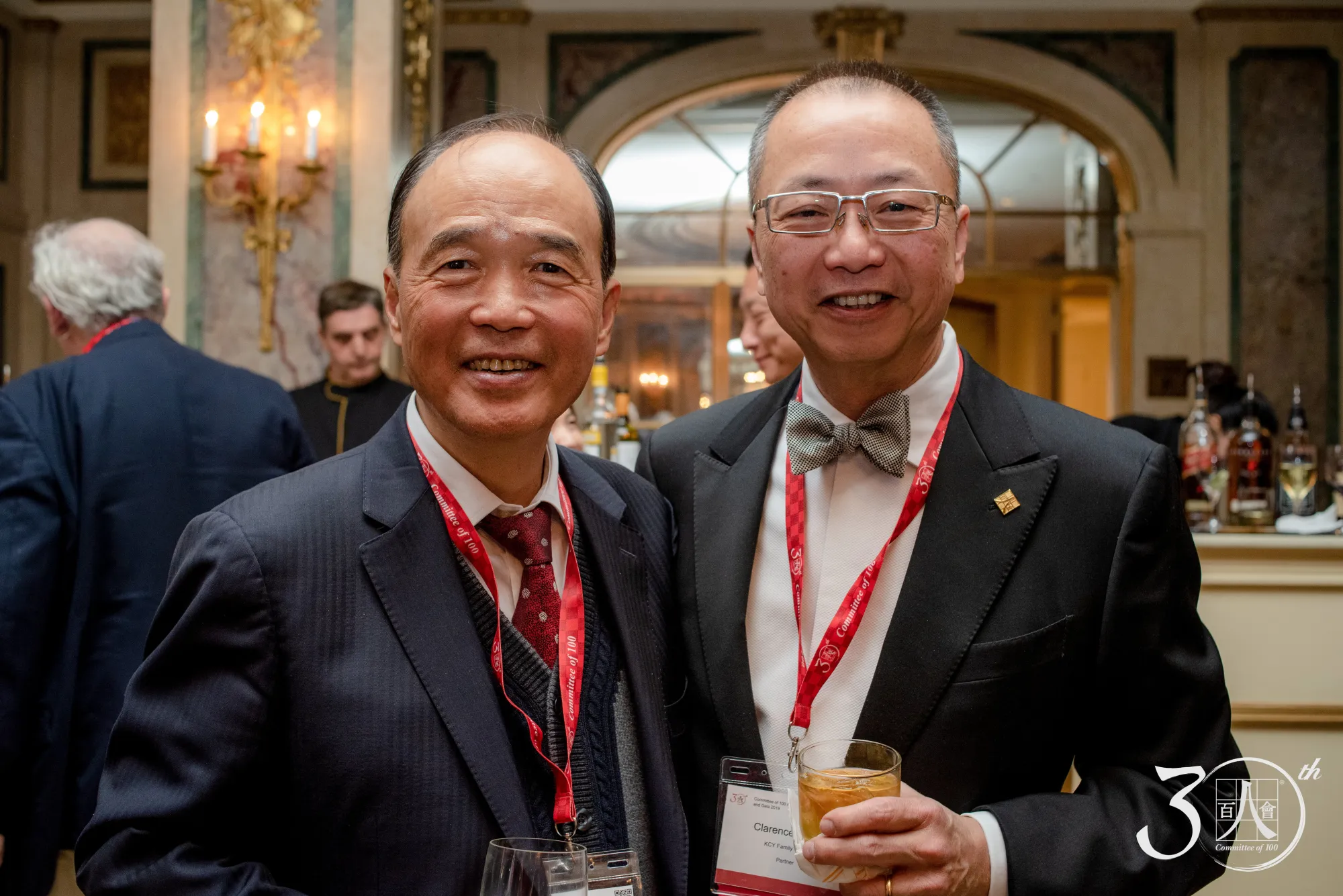
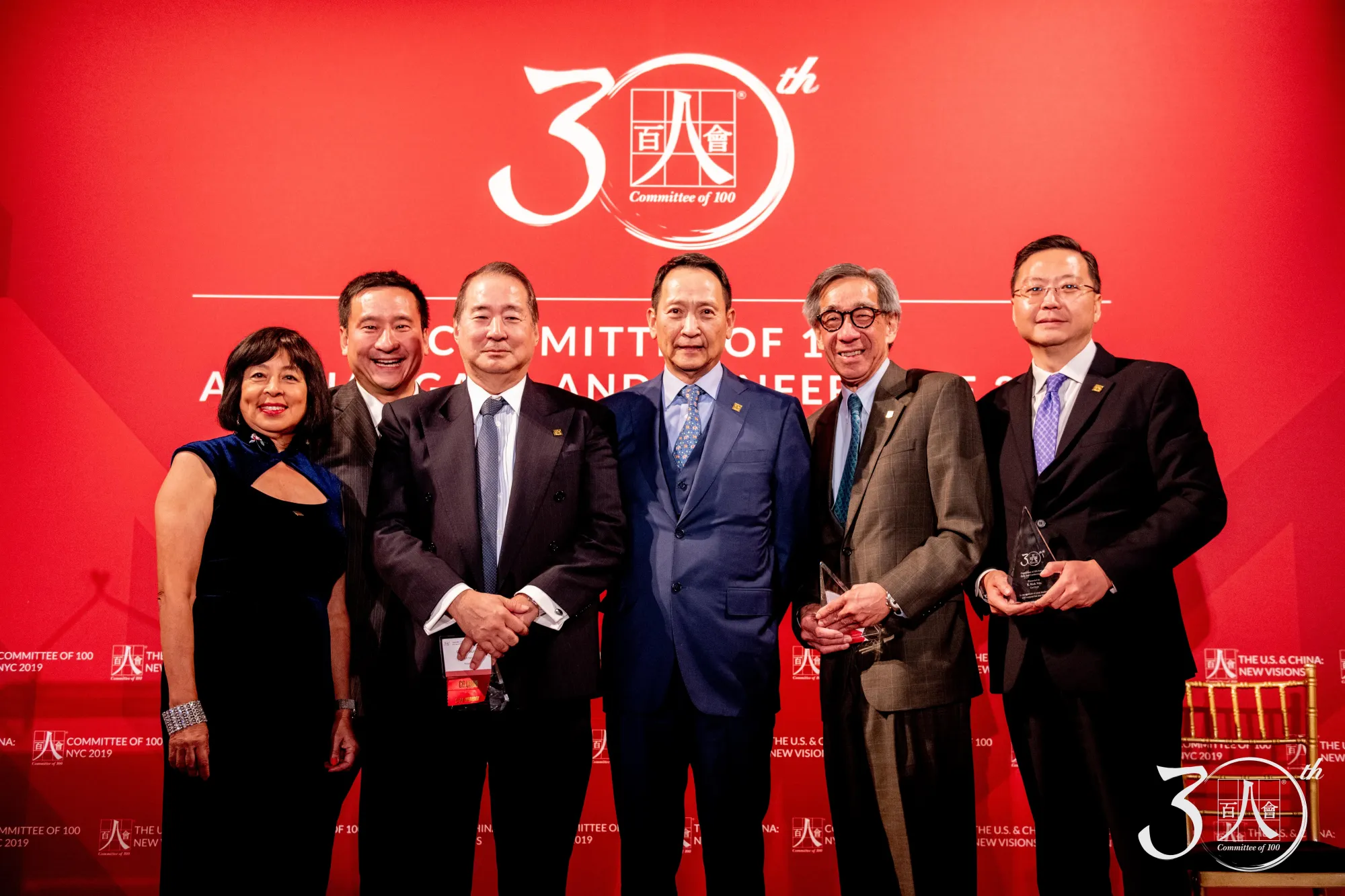
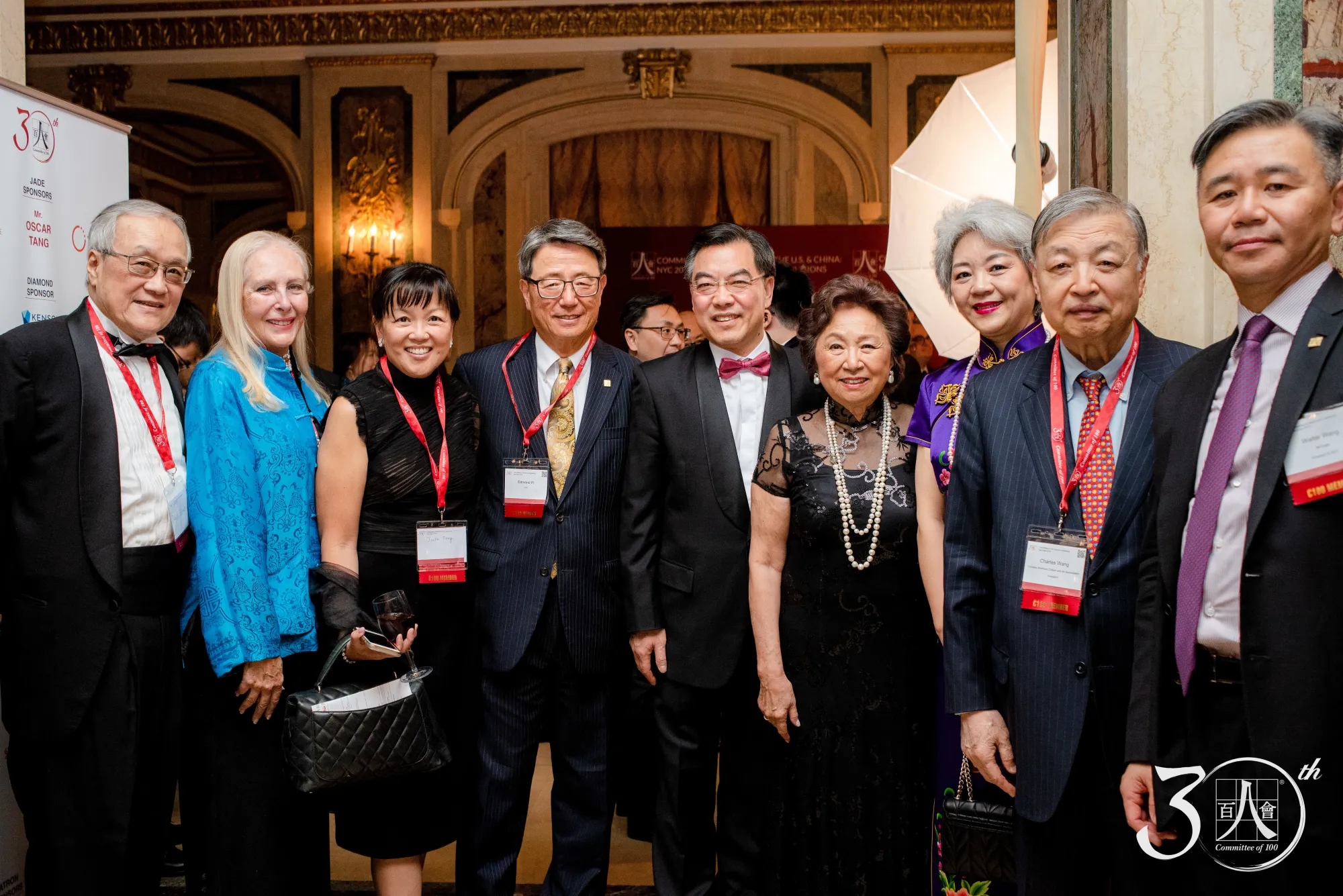
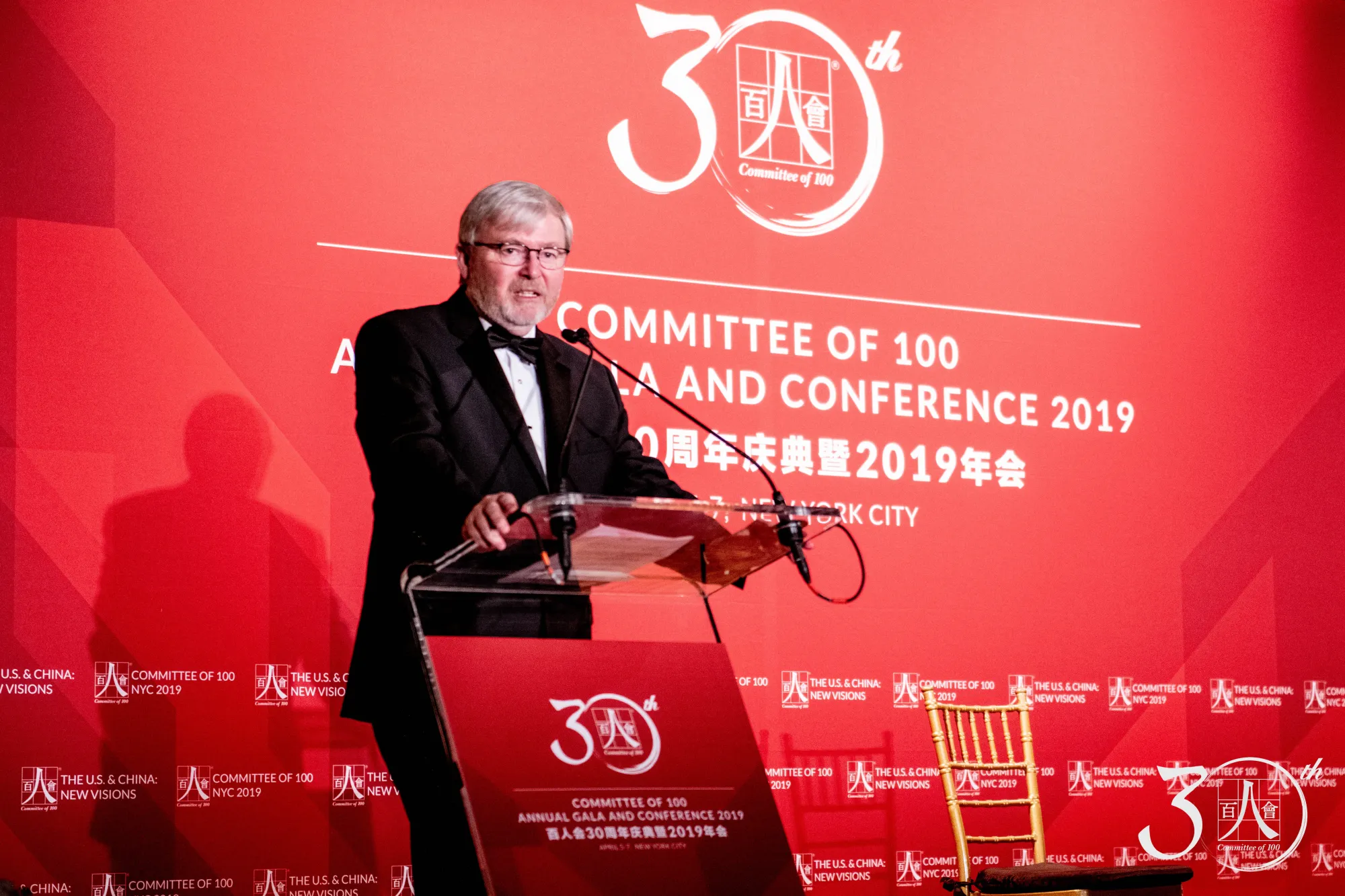
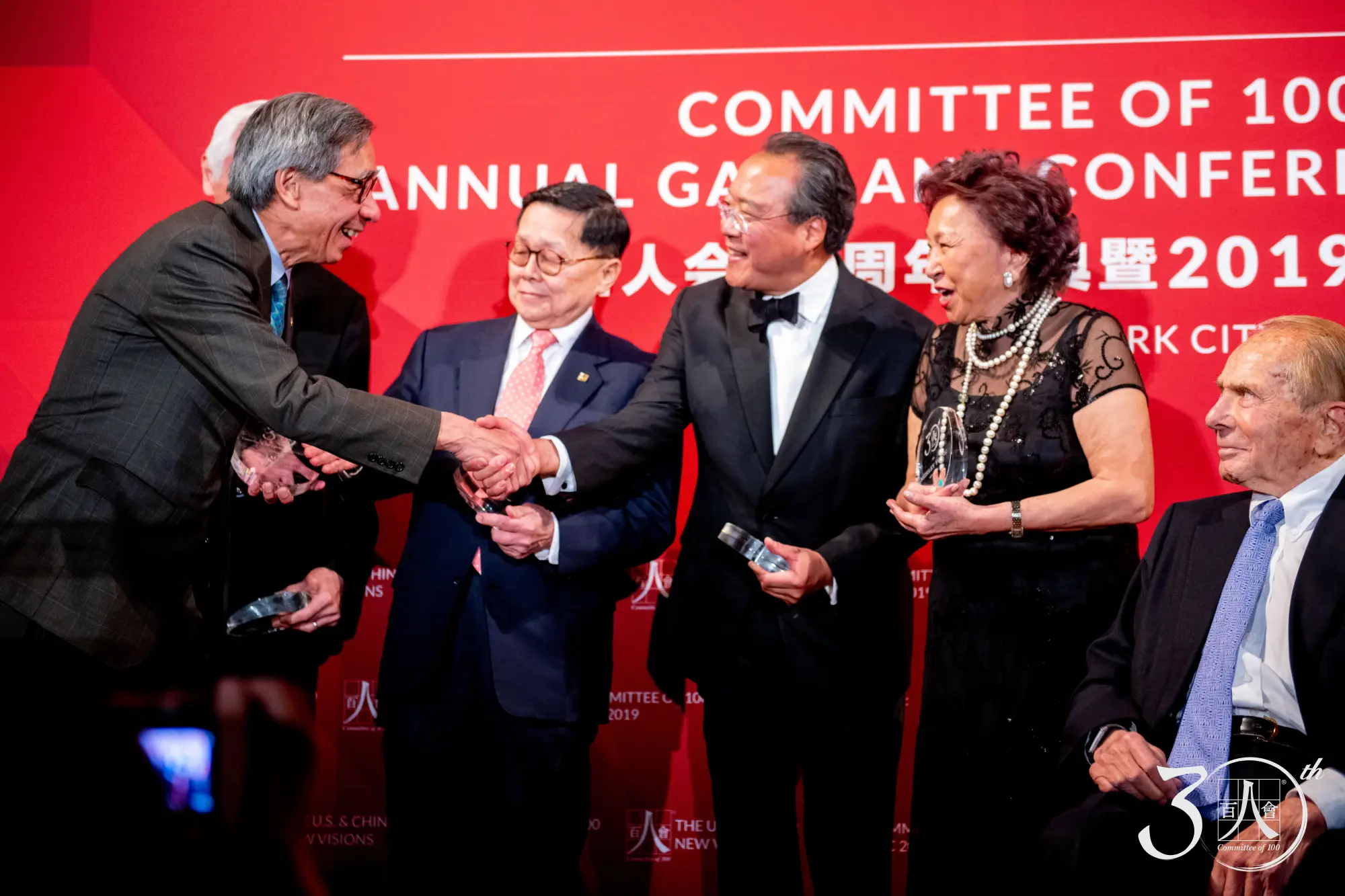
Back to Top
Full-Day Conference
A full-day conference took place on Saturday, April 6 and included more than 20 distinguished speakers and five panel discussions on a variety of topics.
The first panel, “Reflections and Outlook from Former U.S. Ambassadors”, dove into the political ties and diplomatic relations between the two countries, and was chaired by Lanhee Chen, Former Policy Director to Mitt Romney, Fellow at the Hoover Institution and C100 member, with Ambassador Craig Allen, President, USCBC; Ambassador Max S. Baucus, Co-Founder, Baucus Group LLC; and Ambassador J. Stapleton Roy, Founding Director Emeritus, Kissinger Institute on China and the United States. The panelists agreed that the focus should be on collaboration and progress rather than ideological issues which are inherent across different cultures and systems.
Peter Young, President & Managing Director, Young & Partners and Committee of 100 member chaired the second panel, “The Rise of China Biopharma: Opportunity, Threat or Both?”, which featured industry leaders Helen Chen, Greater China Managing Director, L.E.K. Consulting; Stephen P. Spielberg, Former Deputy Commissioner for Medical Products, U.S. FDA and Young & Partners Senior Advisor; and Xiaoqiang Yan, CEO & CSO, Generon (Shanghai) Corporation Ltd. The panel discussed the rapid rise of the Chinese Biopharma industry and the impact that this development will have on the global pharmaceutical industry. The panel highlighted China’s emergence as a new drug innovation center.
Next, Richard Lui, MSNBC and NBC Anchor, chaired a panel entitled “Fintech or Techfin? What’s Next for Global Financial Services” and hosted experts Thomas J. McInerney, President & CEO, Genworth Financial; Vincenzo La Ruffa, Partner, Aquiline Capital Partners; and Ken Xie, Founder, Chairman of the Board & CEO, Fortinet and C100 member. McInerney spoke about development of various insurance and retirement products in China alongside their potential future parent, China Oceanwide. Speaking about where they can invest in better fintech products together, he said, “I think China, just because it is a more mobile savvy consumer base, that a lot of [investment] will go into those types of delivery mechanisms.”
During the luncheon, a video was featured chronicling the construction of America’s transcontinental railroad. The video entitled, “Celebrating the Transcontinental Railroad: 150 Years of Chinese American Contributions,” highlighted the contribution of Chinese workers to that effort and, since then, the growth of America.
Following the luncheon, the afternoon panel was “The Human Connection: China and America in Culture and Entertainment” and featured well-known leaders in the U.S.-China arts and entertainment, Yu Gong, Founder & CEO, iQIYI; Robert Nederlander, Jr., President & CEO, Nederlander Worldwide Entertainment; Joseph W. Polisi, President Emeritus & Chief China Officer, The Juilliard School; and Benjamin T. Wood, Founder, Studio Shanghai Architectural Firm. It was chaired by Shirley Young, President, U.S.-China Cultural Institute and C100 Governor. Gong highlighted that iQIYI has curated content to bridge the tastes of both American and Chinese audiences, which has helped introduce Chinese culture and entertainment to international markets.
The final panel, “New Engines for U.S.-China Economic Prosperity,” featured Richard Edelman, President & CEO, Edelman; Shan Li, CEO, Silk Road Finance Corporation; and Yang Liu, Chairperson & Chief Investment Officer, Atlantis Investment Management, and was moderated by Xiang Zhang, President, University of Hong Kong. The panelists exhibited hope about the economic futures of the U.S. and China. In spite of expected challenges within the world’s largest two economies, they believe that both countries have new growth engines in infrastructure, finance, technology and innovation.
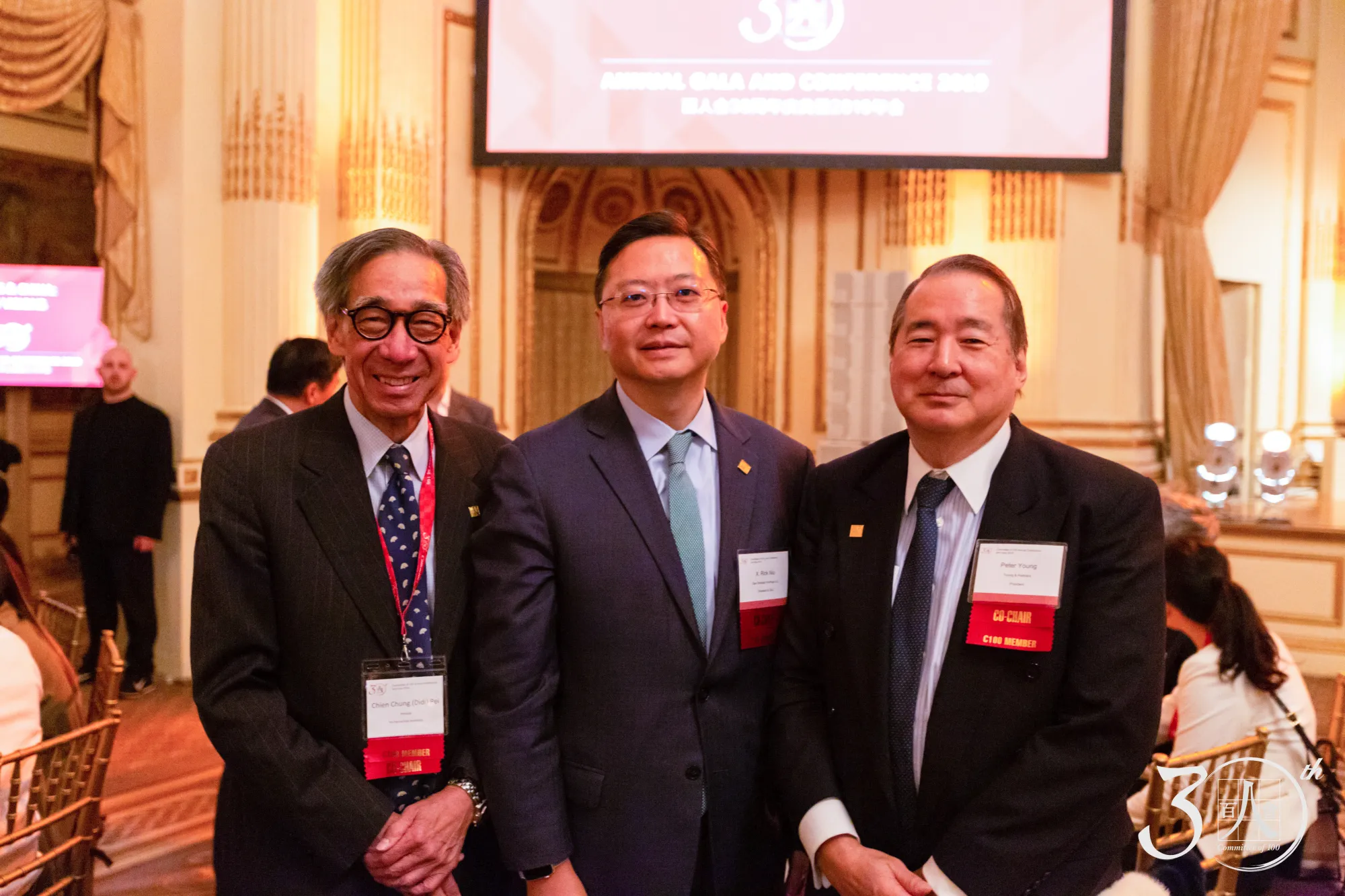
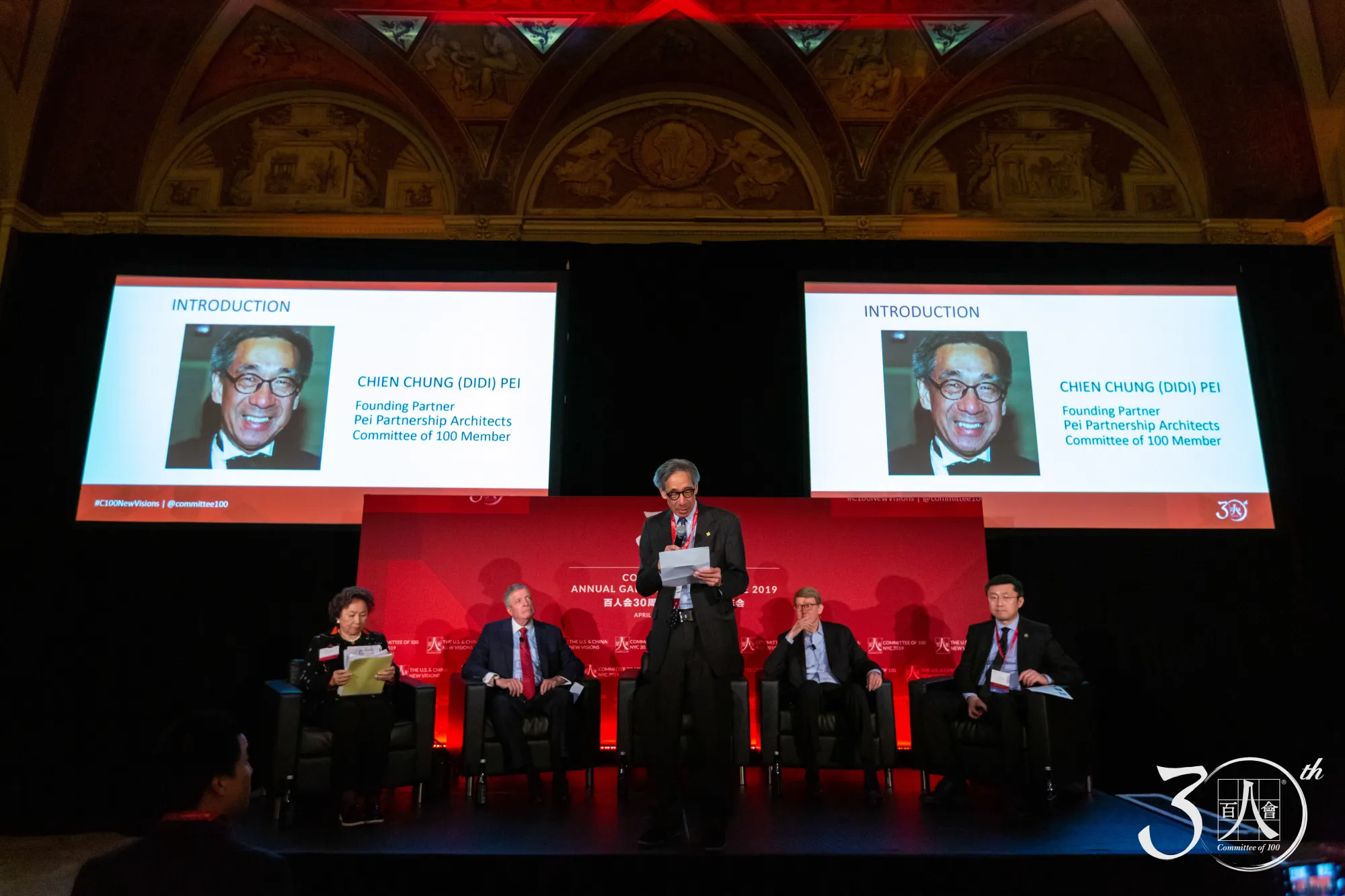
Town Hall
The Committee of 100 Town Hall on April 7 featured discussions on Chinese American civic engagement and leadership and addressed important issues concerning the Chinese American community nationwide.
The Town Hall opened with a Fireside Chat with the Co-Founders and Co-Chairs of Panda Restaurant Group, Inc., C100 member Andrew J.C. Cherng and Peggy Cherng, and was moderated by C100 member Dr. David Chang, Chairman and CEO of GMEO and Professor Emeritus at New York University. Reflecting on their company’s successes, the Cherngs credited their focus on the importance of the company’s culture. “Panda Express is founded based on culture and people. Our mission is to better people’s lives. We are trying to solve problems with regard to how we take care of ourselves,” C100 member Andrew Cherng said. The Cherngs sought to not only do well financially, but also to cultivate the potential of their employees. “Believe in yourself. No matter what your field is, you should pursue your dream,” Peggy Cherng added.
Following the fireside chat, Dr. Gordon H. Chang, Olive H. Palmer Professor in Humanities at Stanford University and C100 member, gave a presentation entitled, “Celebrating the Transcontinental Railroad: 150 Years of Chinese American Contribution.” Dr. Chang discussed his new book, Ghosts of Gold Mountain: The Epic Story of the Chinese Who Built the Transcontinental Railroad. In the 19th century, Chinese workers, he has documented, perilously risked their lives to make the transcontinental railroad possible. Less widely known are their contributions to the founding of Stanford University. Leonardo Stanford, the founder, built his fortune out of the transcontinental railroad and, by extension, the work of thousands of Chinese immigrants. Unfortunately, historians lack records on the number of Chinese workers who died building the railroad. “Some Chinese Americans have come a long way identifying their ancestors as railroaders, since there’s no better way proving that we built America,” Dr. Chang said.
Next, Nancy Yao Maasbach, President of the Museum of Chinese in America (MOCA), talked about the importance of preserving Chinese American history and stories. “There are valuable stories to record from Chinese in this country to explore your identity. That’s why the museum [MOCA] was founded. We must work faster, because stories are going away as old people pass away,” she said. Chinatowns emerged in the U.S., she argued, not because they were tourist attractions. Rather, Chinese residents built such towns for safety and commerce, in a time of intense anti-Chinese sentiment. The Chinese Exclusion Act of 1882, for instance, targeted Chinese workers. The Exclusion Act was the first law to ever prevent all members from a specific group from immigrating to the U.S. Strikingly, the Act was not fully repealed until 1965, nearly 83 years later.
C100 members X. Rick Niu and Chiling Tong shared their personal perspectives as part of the “Chinese American Journey”, a series of TED-style presentations that showcase the inspiring stories of extraordinary Chinese Americans and how they have become leaders in their respective fields. Past “Chinese American Journey” presentations can be accessed on Committee of 100’s YouTube channel, Committee100.
Tong, President and CEO of Asian/Pacific Islander American Chamber of Commerce and Entrepreneurship (ACE), expressed gratitude for the sacrifices of heroes who laid the foundation of Asian Americans to succeed in the U.S. today. Although there is a stereotype that Asian Americans tend to put their “heads down” and work hard, Tong encouraged Asian Americans to work hard while making sure their voices are heard and to build diverse relationships.
Niu, President and CEO of Starr Strategic Holdings LLC, spoke about his journey to the U.S. He believes significant opportunities are growing for Chinese Americans in the U.S. “Don’t think yourself as a minority, but instead as an American. This is a country where everyone can find a natural extension of himself or herself. When games get changed and rules get broken, embrace the transformation. This is the world today and opportunity for you. This is the moment for you to shine,” he said.
The Town Hall concluded with a special discussion and performance entitled “An American Soldier: How Opera Can Transform A Tragedy into Social Awareness.” Moderated by Nancy Yao Maasbach, the discussion featured the opera An American Soldier composer Ruo Huang and playwright David Henry Hwang. While David Henry Hwang has been writing on Asian Americans for 40 years, Ruo Huang is a younger artist and was born and trained in Asia. They shared their personal stories and how their experiences shaped them as artists, and discussed how their collaboration enabled them to learn from each other. Huang said without a doubt art was what he was meant to do. Hwang echoed this sentiment by saying that he believes art is his calling and that he feels a social responsibility to make a difference through his work. The discussion also included excerpts from the opera itself performed by Stephen Buck, Shelley Monroe Huang, Fang Tao Jiang, Mika Shigematsu, and Andrew Stenson.
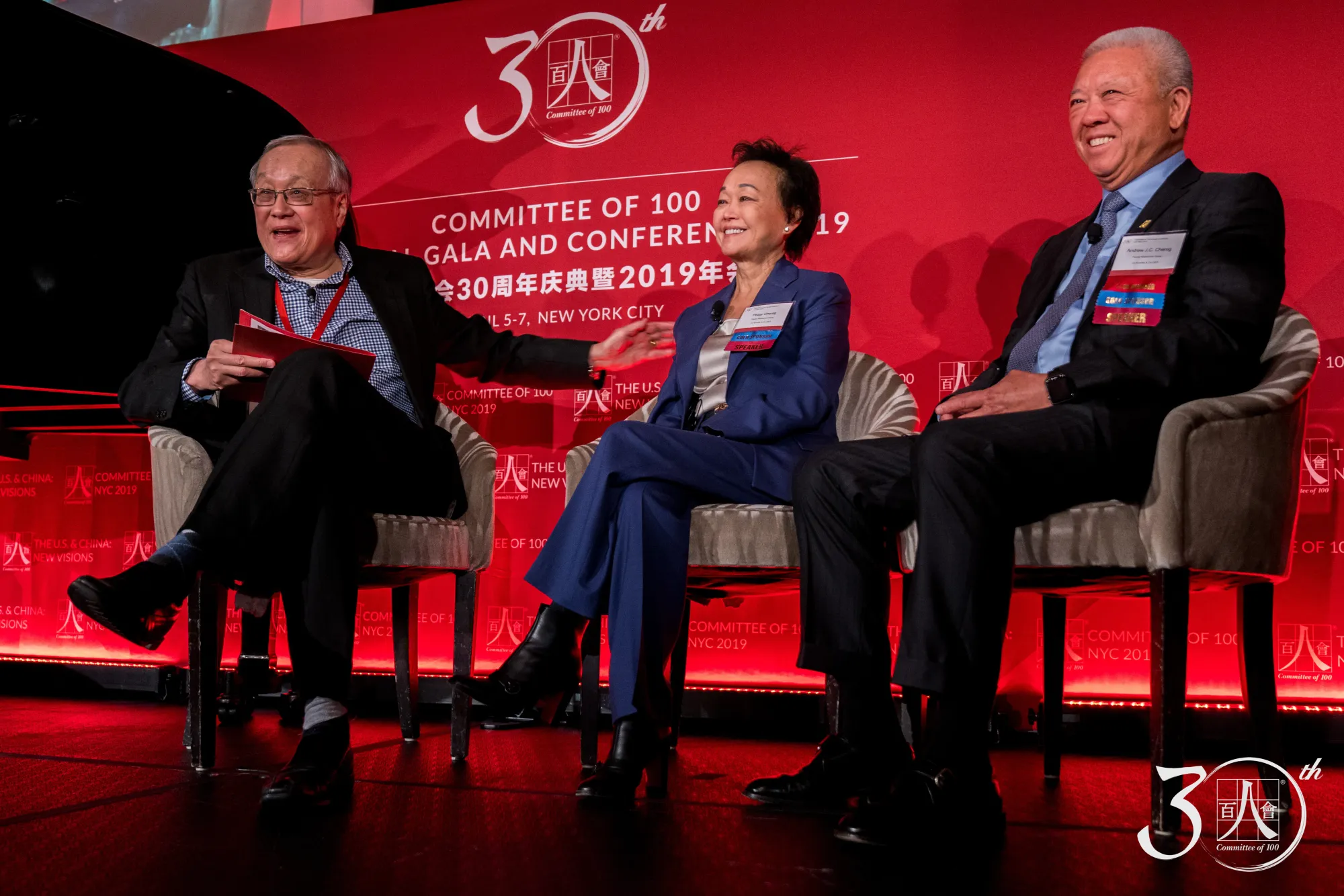
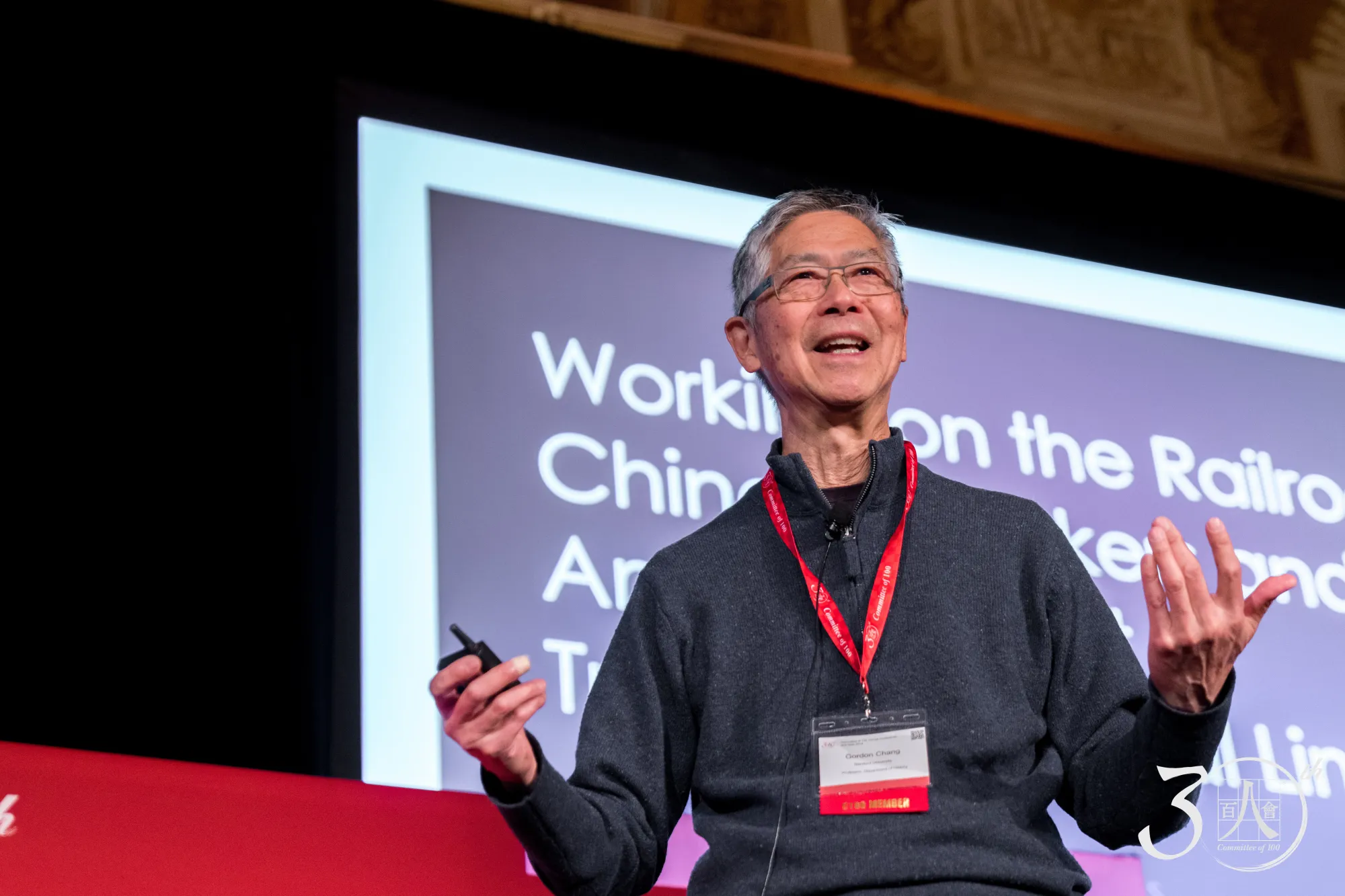
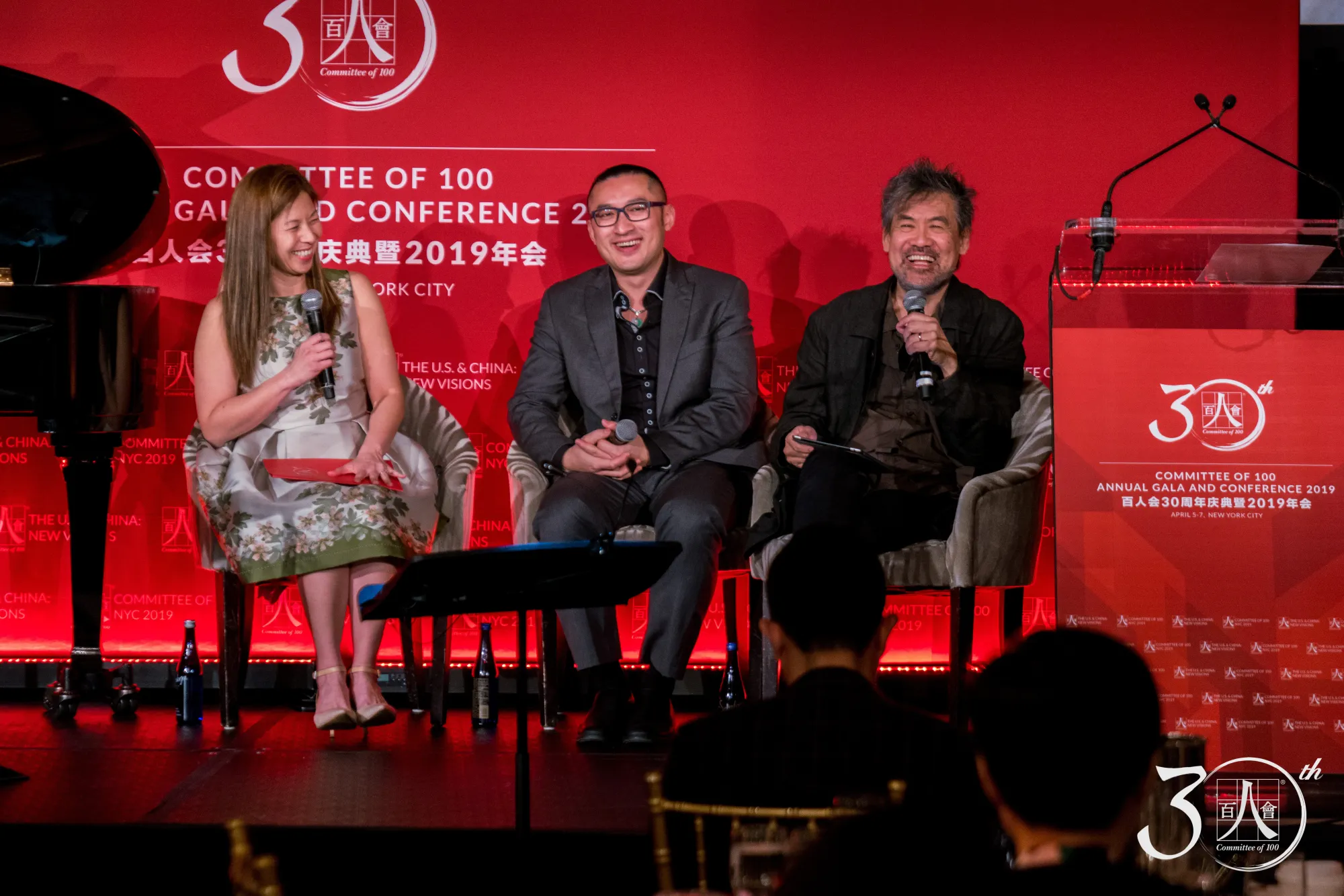
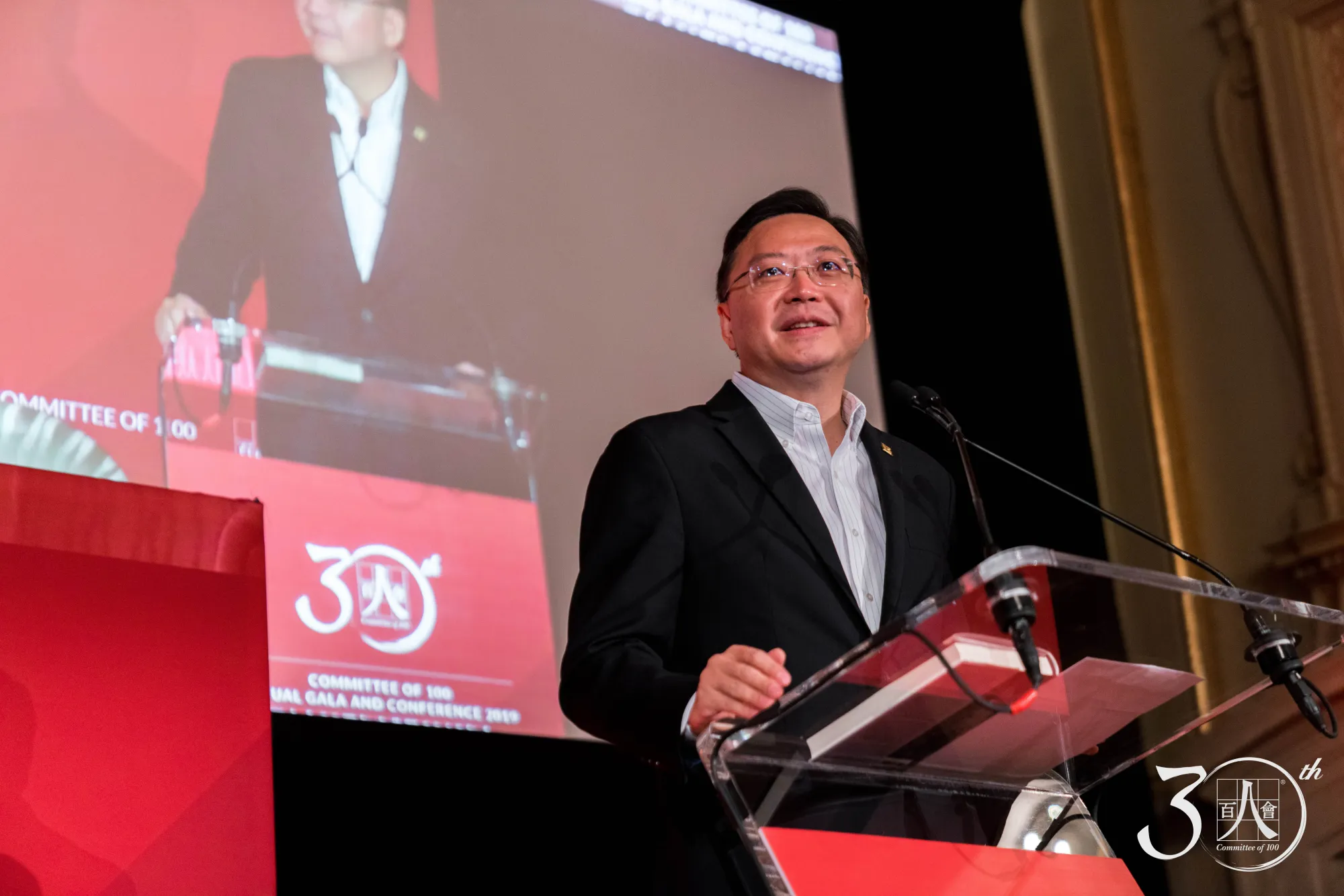
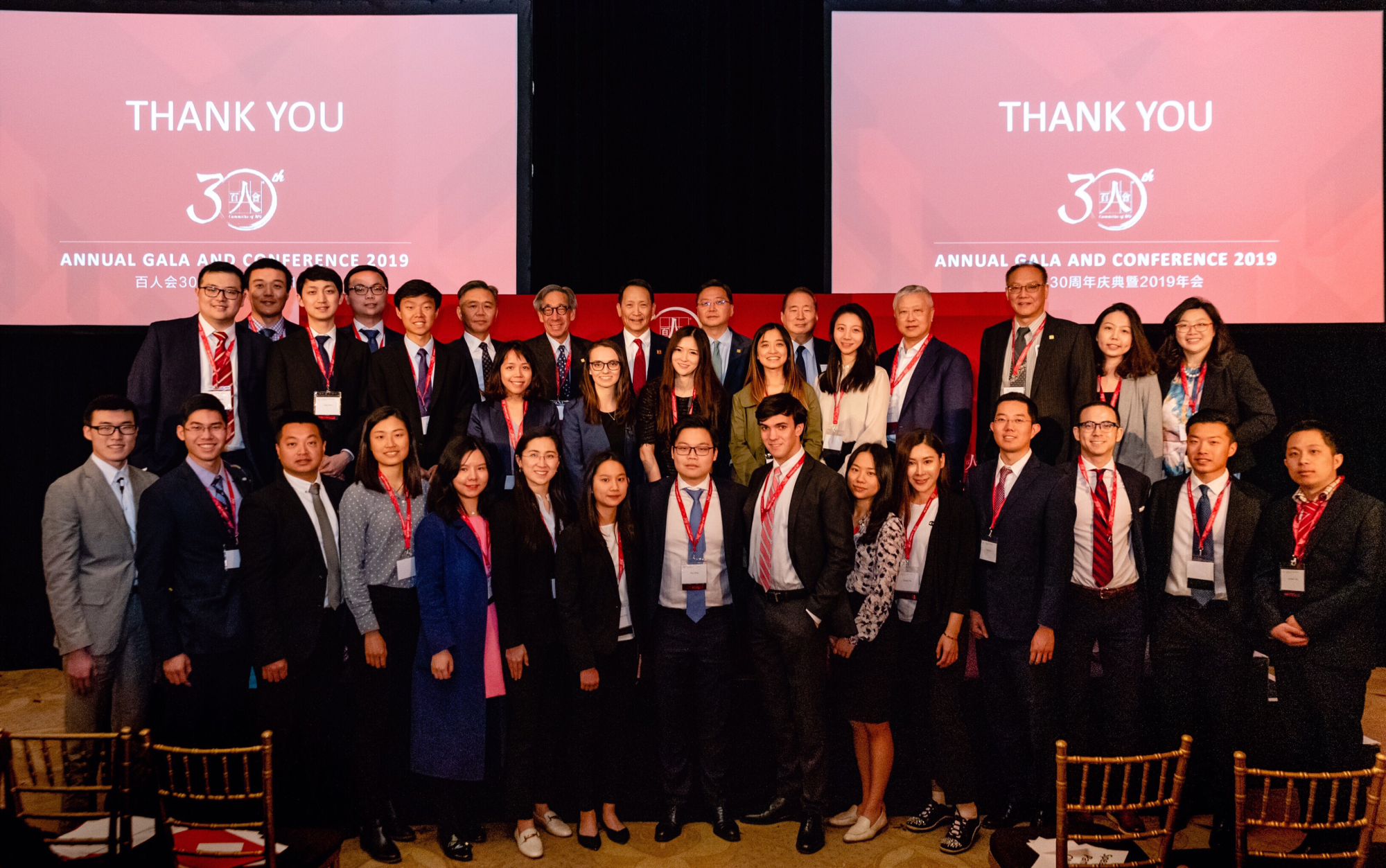
Back to Top
Media Coverage
- April 12, 2019: Ambassador Huang Ping, China’s Consul General in New York, Attends Committee of 100 2019 Annual Conference and Gala Dinner 驻纽约总领事黄屏出席百人会2019年年会晚宴 | Consul General of the People’s Republic of China in New York
- April 11, 2019: Prominent Chinese American Leadership Group Criticizes “Increasingly Common” Racial Profiling in the U.S. 精英美籍华人团体批评,美国种族偏见“日益普遍” | Forbes
- April 10, 2019: Committee of 100 Debate: Is It Inevitable that China Will Become the Leading Economy? 百人会“大辩论”:中国势必成为第一经济体?| FT中文网
- April 10, 2019: Edelman: Huawei Controversy Is Damaging Trust in ‘Brand China’ Edelman: 华为争议事件正在伤及中国品牌的形象 | Forbes
- April 9, 2019: Why iQIYI, Inc. (IQ)’s Stock Is Melting Up 3.34% Today | Findanews
- April 9, 2019: Anti-China Movement is Making a Comeback: Who is Fueling the Fire? 排華運動捲土重來 誰為它添柴火? | World Journal
- April 9, 2019: Racial Profiling of Chinese-Americans Makes People Shudder | Global Times
- April 9, 2019: Committee of 100 Annual Conference Explores Prospects for U.S.-China Relations and Condemns Chinese American Racial Profiling 美国百人会2019年会 探讨美中关系合作前景 呼吁停止华裔间谍论 | GCTV
- April 8, 2019: Former U.S. Diplomats in China Believe U.S.-China Relations Will Continue Moving Forward 美国前驻华外交官认为美中关系向前发展的趋势不会改变 | China Radio International
- April 8, 2019: Panda Express Founders: People-oriented Culture Stimulates Employees’ Potential 熊貓快餐創始人:以人為本激發員工潛力 | World Journal
- April 8, 2019: Committee of 100: Racial Profiling Against Chinese Americans Causes Chilling Effect 百人會:對美籍華人帶種族偏見的刻板 令人不寒而慄 | World Journal
- April 8, 2019: C100 Annual Conference in NYC: U.S. and China Share New Visions of Development | China Plus
- April 8, 2019: iQIYI Founder and CEO Gong Yu Speaks at Committee of 100: Technological Innovation Accelerates the Going Global of China’s Entertainment Industry | PR Newswire
- April 7, 2019: Committee of 100 Annual Conference Explores Issues Including Prospects for U.S.-China Relations and Bilateral Cooperation 美国百人会年会探讨中美关系前景与双边合作等议题 | CCTV中文国际
- April 7, 2019: Committee of 100 Issues a Solemn Statement Against “Racial Profiling” 百人會發表嚴正聲明 反對「種族歸納」現象 | Sing Tao Daily
- April 7, 2019: Committee of 100 Panel: China Biopharma Is Rising Rapidly to Catch Up with the U.S. 百人會論壇:中國生醫發展 快速追趕美國 | World Journal
- April 7, 2019: Committee of 100 Issues a Statement Condemning Racial Profiling Against Chinese 百人会发声明 谴责对华人种族偏见 | SinoVisionNet 美国中文网
- April 7, 2019: Committee of 100 Hosts Its 30th Annual Conference 百人会举办第30届年会 | The China Press 纽约侨报
- April 7, 2019: Committee of 100 Celebrates Its 30th Anniversary, Discusses New Visions of U.S.-China Relations 美国百人会庆祝成立30周年 各界共商美中关系新愿景 | China Radio International
- April 7, 2019: Spotlight: “Practical Approach” Urged to Forge Ahead Sustainable U.S.-China Ties: Former U.S. Diplomats | Xinhua
- April 7, 2019: China’s Booming Middle Class Creates Opportunities for Culture, Entertainment Industry: Business Leaders | Xinhua
- April 7, 2019: Hank Greenberg is ‘Not for Socialism, in Any Form,’ Praises Trump | Yahoo! Finance
- April 7, 2019: Huawei Controversy Is Damaging Trust in “Brand China”, Edelman Says | Forbes
- April 6, 2019: Committee of 100 Honors Morris Chang and Peter Wang at Its 30th Anniversary 百人會30周年 表彰張忠謀、王孟杰 | World Journal
- April 6, 2019: Committee of 100 Discusses U.S.-China Relations: Need Patience and Perseverance 百人會談美中關係 需耐心恆心 | World Journal
- April 6, 2019: China’s Outbound Investment in U.S. Expected to Rebound, Expert Says | Xinhua
- April 6, 2019: Committee of 100 Annual Conference Explores Issues Including Prospects for U.S.-China Relations and Bilateral Cooperation 美国百人会年会探讨中美关系前景与双边合作等议题 | Xinhua News
- April 4, 2019: Committee of 100’s 30th Anniversary Celebration Convenes Global Leaders and Yo-Yo Ma | NYC VIBE
- April 5, 2019: Survey Says: U.S. CEOs More Interested in China than Chinese CEOs Are Interested in U.S. | Forbes
- April 5, 2019: Survey: CEOs Worry China Trade Relations Could Be ‘Rocky’ for Foreseeable Future | Yahoo! Finance
Back to Top
Volunteers
Adeline Cui Deng, Ashley Chui, Ayer Chan, Barry Chien, Brendan Powers, Christopher Yap, Clement Dai, David Ying, Ding Shen, Eric Zhao, Haoyuan Ma, Hiu Ning Tiffany Chui, Jiang Li, Leo Liu, Linxuan Yan, Peiran Qiu, Peter Zhang, Qiliang Lin, Roger(Junjie) Hong, Ruobing Song, Ryan A. Leonard, Tianyang Zhang, Wei Zhang, Yifei Liu, Yufeng Ling, Yuhe Liu, Ziyuan Hu